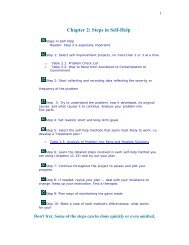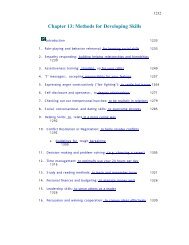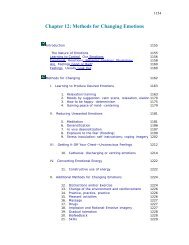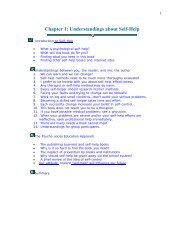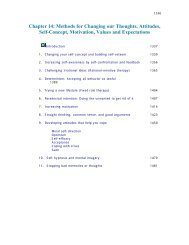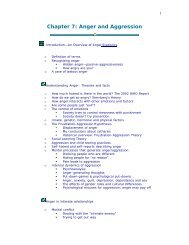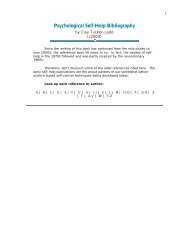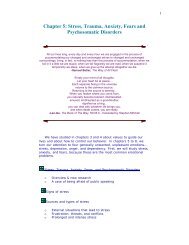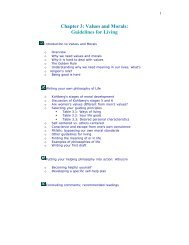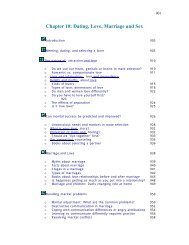Methods for Changing Behaviors - Psychological Self-Help
Methods for Changing Behaviors - Psychological Self-Help
Methods for Changing Behaviors - Psychological Self-Help
Create successful ePaper yourself
Turn your PDF publications into a flip-book with our unique Google optimized e-Paper software.
Chapter 4 describes operant, classical, and social learning. These<br />
theories will help you understand how antecedents-behaviorconsequences<br />
relationships are <strong>for</strong>med and maintained. Chapter 4 also<br />
explains why some behaviors are hard to understand; this may help<br />
too. Some of the questions above also involve many other factors that<br />
might influence our behavior besides learning procedures, such as<br />
values, unconscious needs and motives, games, unresolved emotional<br />
situations, etc. These other factors are discussed in chapters 4, 9, 14,<br />
and 15.<br />
This process called "behavioral analysis" is the essence of all<br />
ef<strong>for</strong>ts to understand human behavior. The various theories-psychoanalysis,<br />
social learning, humanistic, behavioral, Gestalt, etc.-simply<br />
emphasize different factors among the antecedents or the<br />
consequences. By repeatedly attempting to understand human<br />
behavior in this way, you are becoming an "insightful" psychologist. Be<br />
sure to discuss your "theories" with others; you need to consider many<br />
points of view.<br />
STEP FIVE: Use the self-awareness from the behavioral analysis<br />
to exercise better self-control.<br />
The knowledge from this method leads directly into using <strong>Methods</strong><br />
1 and 3, involving antecedent stimulus control, and <strong>Methods</strong> 16, 17,<br />
and 18, involving control of the consequences, in order to develop<br />
plans <strong>for</strong> creating a new response, a new way of handling a problem.<br />
Anyone who has learned a new habit--exercising, picking up dirty<br />
clothes, overcoming shyness--realizes that the new behavior is hard to<br />
start. At first, the old behavior is so much easier, it's still automatic.<br />
However, after 3 to 4 weeks of daily practice, the "hard" new habits<br />
become automatic and easy too. There is no known alternative to<br />
simply pushing yourself to carry out the new better habits until they<br />
become "natural."<br />
As we learned in chapter 5, almost any change is stressful, even<br />
though it is an improvement. Furthermore, the ramifications of<br />
seemingly small changes may be far reaching. Examples: deciding in<br />
the sixth grade to go out <strong>for</strong> several sports may influence your career,<br />
your choice of friends and spouse, your life-long interests, etc.<br />
Likewise, if you decided to become a serious student... In some cases,<br />
however, the "cost" of the new habit, in terms of ef<strong>for</strong>t and<br />
ramifications, may seem too high.<br />
Time involved<br />
An hour or so will be involved in the arm chair philosophizing about<br />
the role of the antecedents and consequences. The actual observation<br />
and recording will take 10 to 30 minutes a day <strong>for</strong> a couple of weeks.<br />
The behavioral analysis will be another hour if you keep your<br />
explanations strictly behavioral. (If you branch out into other theories,<br />
e.g. "what games am I playing?" or "did my relationship with my<br />
1103



